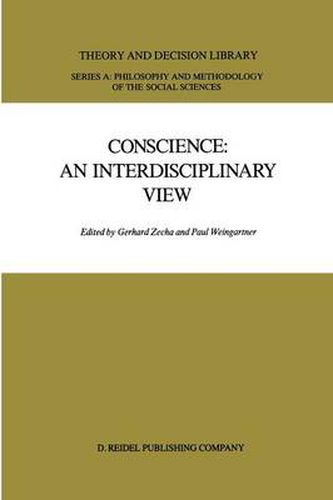Readings Newsletter
Become a Readings Member to make your shopping experience even easier.
Sign in or sign up for free!
You’re not far away from qualifying for FREE standard shipping within Australia
You’ve qualified for FREE standard shipping within Australia
The cart is loading…






This title is printed to order. This book may have been self-published. If so, we cannot guarantee the quality of the content. In the main most books will have gone through the editing process however some may not. We therefore suggest that you be aware of this before ordering this book. If in doubt check either the author or publisher’s details as we are unable to accept any returns unless they are faulty. Please contact us if you have any questions.
Value change and uncertainty about the validity of traditional moral convictions are frequently observed when scientific re search confronts us with new moral problems or challenges the moral responsibility of the scientist. Which ethics is to be relied on? Which principles are the most reasonable, the most humane ones? For want of an appropriate answer, moral authorities of ten point to conscience, the individual conscience, which seems to be man’s unique, directly accessible and final source of moral contention. But what is meant by ‘conscience’? There is hardly a notion as widely used and at the same time as controversial as that of conscience. In the history of ethics we can distinguish several trends in the interpretation of the concept and function of conscience. The Greeks used the word O uvEt81lm~ to denote a kind of ‘accompa nying knowledge’ that mostly referred to negatively experienced behavior. In Latin, the expression conscientia meant a knowing together pointing beyond the individual consciousness to the common knowledge of other people. In the Bible, especially in the New Testament, O uvEt81l0 t~ is used for the guiding con sciousness of the morality of one’s own action.
$9.00 standard shipping within Australia
FREE standard shipping within Australia for orders over $100.00
Express & International shipping calculated at checkout
This title is printed to order. This book may have been self-published. If so, we cannot guarantee the quality of the content. In the main most books will have gone through the editing process however some may not. We therefore suggest that you be aware of this before ordering this book. If in doubt check either the author or publisher’s details as we are unable to accept any returns unless they are faulty. Please contact us if you have any questions.
Value change and uncertainty about the validity of traditional moral convictions are frequently observed when scientific re search confronts us with new moral problems or challenges the moral responsibility of the scientist. Which ethics is to be relied on? Which principles are the most reasonable, the most humane ones? For want of an appropriate answer, moral authorities of ten point to conscience, the individual conscience, which seems to be man’s unique, directly accessible and final source of moral contention. But what is meant by ‘conscience’? There is hardly a notion as widely used and at the same time as controversial as that of conscience. In the history of ethics we can distinguish several trends in the interpretation of the concept and function of conscience. The Greeks used the word O uvEt81lm~ to denote a kind of ‘accompa nying knowledge’ that mostly referred to negatively experienced behavior. In Latin, the expression conscientia meant a knowing together pointing beyond the individual consciousness to the common knowledge of other people. In the Bible, especially in the New Testament, O uvEt81l0 t~ is used for the guiding con sciousness of the morality of one’s own action.